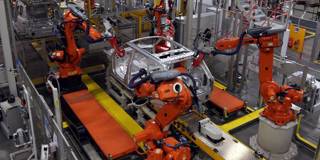 David Jones/PA Images via Getty Images
David Jones/PA Images via Getty Images
工作数字化转型中的赢家和输家
米兰—或许,没有哪个方面的数字革命,比自动化对职业、劳动、就业和收入的影响更受人们关注。这一现象至少有一个很好的理由,但可能不是大多数人会采用的。
使用机器来提高生产力并不是什么新鲜事。就任何充当机器用途的工具而言,人类在这个星球上短暂的历史中,大部分时间都在使用它们提供生产力。但是,自从第一次工业革命以来,蒸汽动力和机械化带来了巨大生产力持续地增长,使这个过程已经进入了超速发展阶段。
但并非所有人都对这种转变表示欢迎。许多人担心,对人类劳动力需求的减少将导致永久性的高失业率。但这不会发生。相反,生产力和收入的提高刺激了需求,从而促进了经济活动的开展。随着时间的推移,劳动力市场在技能方面进行了调整,最终随着收入与休闲之间平衡的转变,工作时间也有所减少。
https://prosyn.org/TlwPqFBzh
To continue reading, register now. It’s free!
Register Now
Already have an account?
Log in



米兰—或许,没有哪个方面的数字革命,比自动化对职业、劳动、就业和收入的影响更受人们关注。这一现象至少有一个很好的理由,但可能不是大多数人会采用的。
使用机器来提高生产力并不是什么新鲜事。就任何充当机器用途的工具而言,人类在这个星球上短暂的历史中,大部分时间都在使用它们提供生产力。但是,自从第一次工业革命以来,蒸汽动力和机械化带来了巨大生产力持续地增长,使这个过程已经进入了超速发展阶段。
但并非所有人都对这种转变表示欢迎。许多人担心,对人类劳动力需求的减少将导致永久性的高失业率。但这不会发生。相反,生产力和收入的提高刺激了需求,从而促进了经济活动的开展。随着时间的推移,劳动力市场在技能方面进行了调整,最终随着收入与休闲之间平衡的转变,工作时间也有所减少。